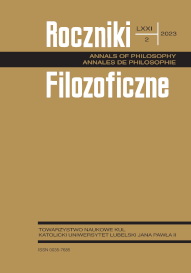ETHICS, RELIGION, AND THE PROBLEM OF LIFE: TOLSTOY’S INFLUENCE ON WITTGENSTEIN’S THINKING ABOUT THE MEANING OF LIFE
ETHICS, RELIGION, AND THE PROBLEM OF LIFE: TOLSTOY’S INFLUENCE ON WITTGENSTEIN’S THINKING ABOUT THE MEANING OF LIFE
Author(s): Maksymilian RoszykSubject(s): Ethics / Practical Philosophy, Russian Literature, Philosophy of Mind, Philosophy of Religion, Sociology of Culture, Sociology of Religion
Published by: Towarzystwo Naukowe KUL & Katolicki Uniwersytet Lubelski Jana Pawła II
Keywords: Wittgenstein; Tolstoy; ethics; meaning of life; religion;
Summary/Abstract: In this paper, I try to show to what extent Wittgenstein’s thinking about the problem of the meaning of life was influenced by Tolstoy. I begin with the problem of what Tolstoy’s writings, especially philosophical, Wittgenstein knew. Then I proceed to three areas of impact: (1) treating the question of the meaning of life as the central problem for philosophy, (2) defining Ethics in terms of the meaning of life, and (3) the idea that the solution of the problem of the meaning of life lies in a practical change, not in giving a theoretical answer, which in turn is broken down into three more specific ideas, namely that (3a) the question concerning the meaning of life is a pseudo-question, that (3b) this vanishing of the question is not yet the solution, and that (3c) the solution of the problem of life consists in taking a religious attitude towards the world. I try to show that in point 1 Wittgenstein accepted Tolstoy’s general idea, but gave it his own version, which in turn makes the definition of Ethics in terms of the meaning of life in point 2 understandable; whereas in point 3 Wittgenstein accepts Tolstoy’s ideas and tries to formulate them in his own way.
Journal: Roczniki Filozoficzne
- Issue Year: 71/2023
- Issue No: 2
- Page Range: 129-146
- Page Count: 18
- Language: English

